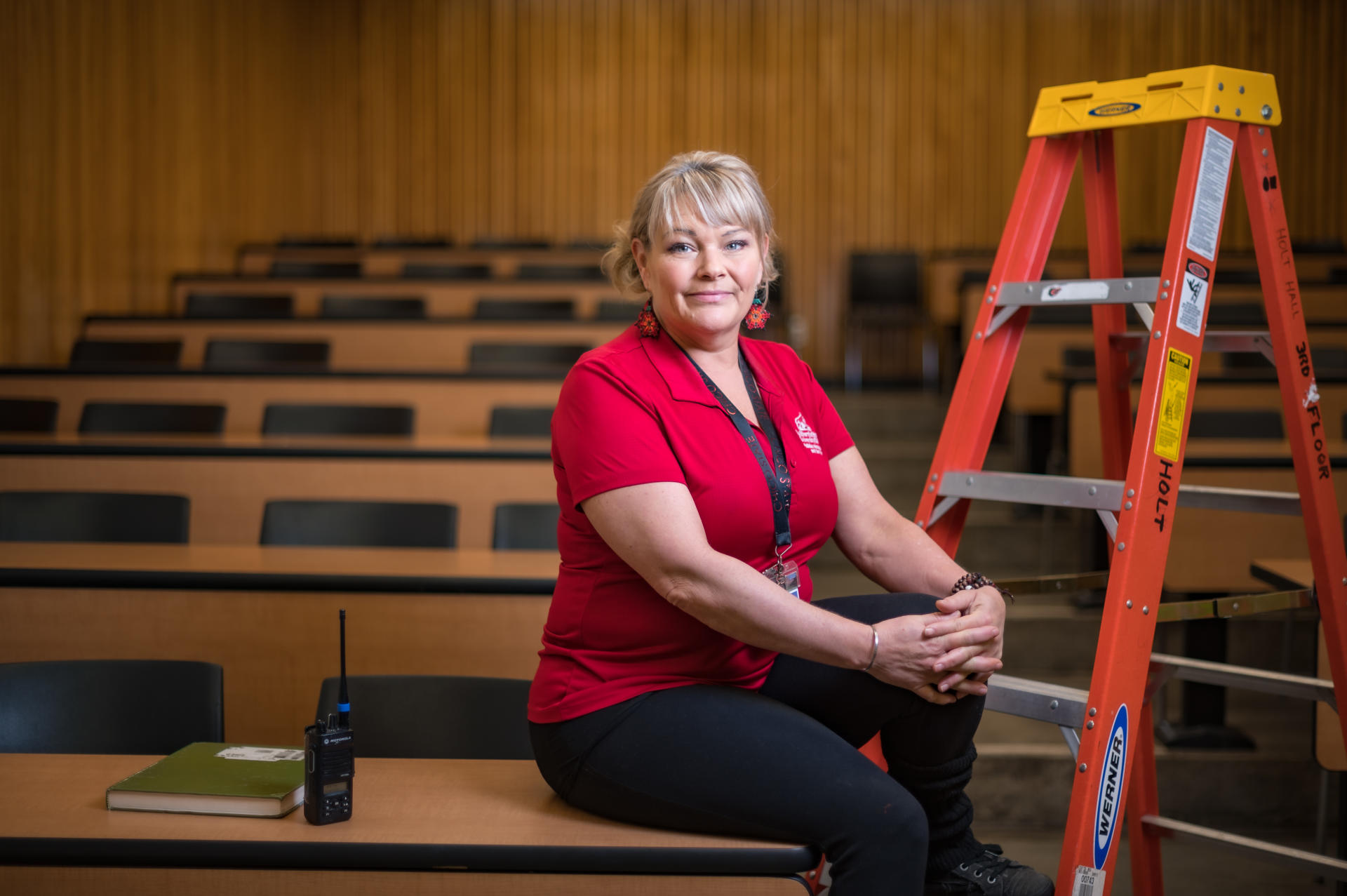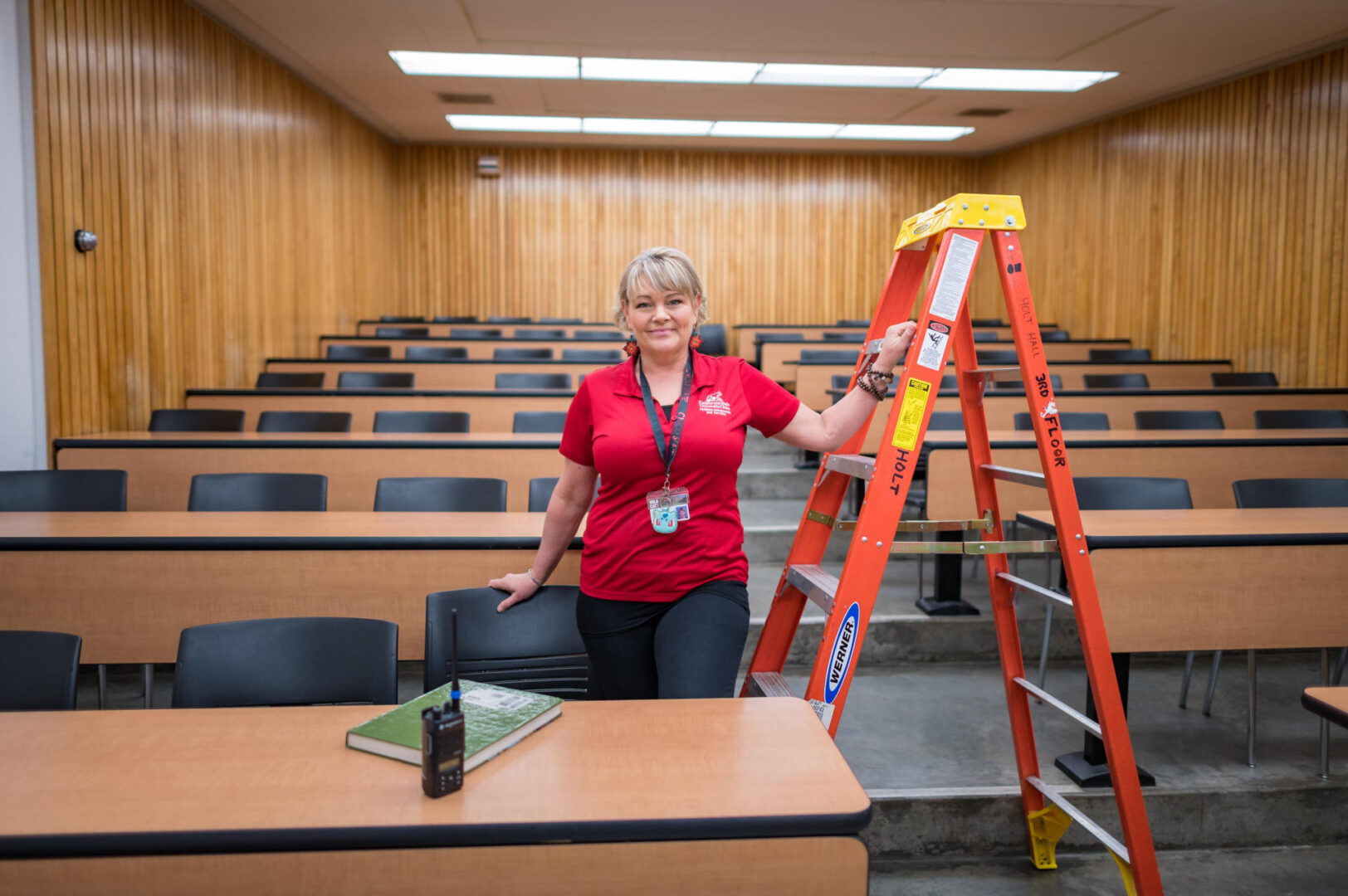Age and Obstacles Don’t Deter Anthropology Major from Pursuing Her Degree

A week before the start of the spring 2023 semester, custodian Cecelia Lore was working on the third floor of Holt Hall. Biological Sciences faculty Don Miller was searching for the classroom where he was teaching the next week—Lore struck up a conversation.
“Cecelia was curious what I was doing in the classroom, and asked what we’d be teaching in there,” Miller said, who told Lore he was teaching “Fundamentals of Ecology.” This caught Lore’s interest and she asked if she could sit in on the class, to simply listen and learn.
“She showed up at class, and has a number of times, and has added substantially,” Miller said. “I thought it was terrific to have her join in like that, I just loved her manner, it was very relaxed and she’s very enthusiastic.”
Lore was feeding the insatiable curiosity that resides inside her—she describes herself as “obsessive about learning.”
“I walk around and show up at professors’ doors to ask them what they do. I want to know what people care about and why they care about it,” she said. “I could spend 20 years walking around here studying from people, if that was feasible.”
What is feasible, however, is Lore’s pursuit of a degree in anthropology—because she is a full-time employee at Chico State, she utilizes the California State University’s Fee Waiver program, which allows eligible staff employees to attend courses and pursue degrees at reduced rates at any of the 23 CSU campuses.
Ashley Person, a senior coordinator for Advising and Student Success in the College of Behavioral and Social Sciences, said that additional access to education can be a game changer for some employees—and Lore exemplifies this.
“In college, we get exposed to so many different ideas and successful people. We get the chance to see more of what’s out there than we otherwise would, and that can change the trajectory of an entire family,” said Person (Political Science, ’10; MPA, ’22), who is also Lore’s academic advisor. “And that all starts with access to education.”
Lore’s early years are pockmarked with neglect and lack of support. She grew up in the foster care system in the South Bay Area and bounced around homes from San Jose and Cupertino to Campbell and Milpitas.
“I didn’t have anybody who cared if I went to school, I didn’t even go to high school,” she said. “When I was 17, I ran away and just kept running amok.”
Through her late-teens and early-20s, she was bedeviled by addiction. Desperate for some semblance of a family and feeling incapable of caring for herself as an adult, she got married at age 20 and gave birth to a girl when she was 21—Lore was motivated to take adult education classes and attain her GED. But at six months old, her daughter was diagnosed with severe disabilities which required full-time care, intensive medical treatments, and numerous surgeries.

“As a 21-year-old with no ‘family’ experience, I like to think that I did my best,” Lore said. “She passed suddenly and peacefully at about 2 1/2 years old and I didn’t have any support to manage it.”
She tumbled back into addiction, the idea of attending college discarded. Five years later, in 2000, her son was born—another shot at her idea of a “perfect family.” At age 3, however, her son was diagnosed with Asperger’s Syndrome. The emotional and educational needs for her son were extensive and prevented Lore from attending college until 2013, when she started at Butte Community College—but she did so off and on.
“I often had to drop or withdraw from classes because I couldn’t manage everything in a healthy way,” she said. “Life kept happening and I lacked the tools and resources to effectively cope.”
When her son turned 18, he wanted to drop out of high school. Still attending Butte, Lore made him a deal.
“I told him if he would work on getting his GED at Butte over the summer and enroll as a student that fall, I would do everything to support him,” she said. “We did it and he started Butte that fall with me.”
The pair carpooled together. When the COVID-19 pandemic pushed classes online, Lore’s son dropped his classes, but she persisted, committing to full-time classes where her goal was to become a respiratory therapist since “that was the fastest route to a good job.” But, like many routes in Lore’s life, this one, too, took a detour. Faculty in Butte’s communications department, who also taught at Chico State, told her she should transfer to Chico State to pursue a bachelor’s degree.
Lore never considered attending a four-year university because she didn’t see many people her age doing so. However, she felt it was important to continue her education at her age and model for her children (she also has a 17-year-old son) and fellow students.
“If they struggle in life and get off track, they’ll remember me as an example of someone else going back to college at 50,” she said. “I feel like it’s important for them to always know that’s a choice.”
Lore began taking classes at Chico State in spring 2023 and was surprised to learn that she qualified for another campus resource, the Promoting Achievement Through Hope (PATH) Scholars program, which serves the specialized needs of our students who identify as current and former foster youth or unaccompanied homeless as minors.
“I was asked to fill out the application, and I said, ‘no, I’m old,’ but they told me I still qualified,” said Lore, who received financial help to, among other things, replace her car battery.
Age, wisdom, and obstacles overcome have helped shape Lore’s life perspective. She continues working in Holt Hall, occasionally rescuing science textbooks from recycling cans and reading them on her lunch breaks. She continues taking classes toward her degree and researching Indigenous tribes in the Amazon. For now, though, Lore is extremely happy with her educational journey.


